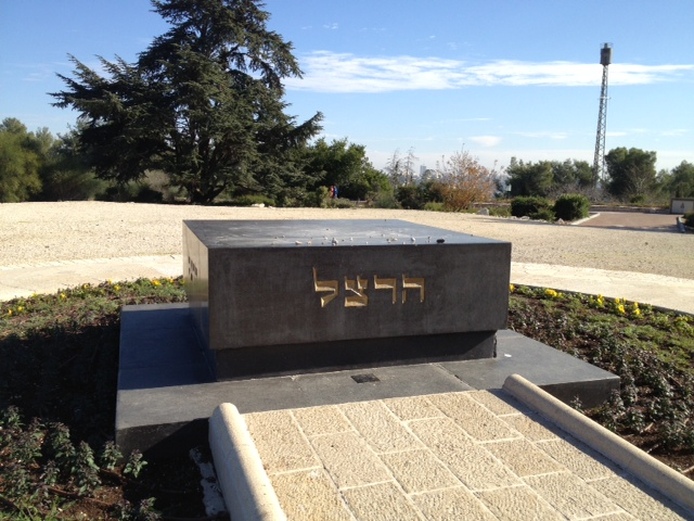The first of our two stops was Mount Herzl where we visited the grave of its namesake, Theodor Herzl, the founder of Political Zionism. Events subsequent to Herzl's death have made him seem like a visionary genius. Had things turned out otherwise, he might have been remembered instead as a zealous snake oil salesman who sold the desperate Jews of Europe a promise with no substance.
European Jews in the nineteenth century lived with a contradiction. On the one hand, they enjoyed an emancipation from past legal subjugation. For the first time, they were citizens of the countries in which they lived. They were permitted to attend university, to own land, to work in professions and to enter normal, middle-class European society.
On the other hand, they continued to live in a society in which antisemitism was constant and normal. Slurs against Jews were heard in the street, in the cafes, and in every corner of so-called "polite" society. Jews were regarded with suspicion, scorn and, often enough, the accusation that they were displacing "real" Germans, "real" Frenchman, "real" Austrians, or whatever other flavor of Christian European they lived amongst.
The incongruity felt by the new middle-class Jews was palpable, heartbreaking and daily. They wondered if they had won anything in emancipation. They began to feel that they never really would be accepted as free people in Europe under any set of circumstances.
That was the situation that Herzl tried to address. He told these middle-class European Jews that they needed to pursue a different solution to "the Jewish problem," and the solution he proposed was extraordinary.
Herzl said that the Jews needed to seek a land of their own where they could be sovereign and set the standards for their own society. He imagined this country as a semi-paradise, in which Jews would create a truly just society in which everyone would be treated as equals.
Herzl's true innovation in pursuing this dream was in the way he sought to achieve it. Herzl was not a religious man. He had no interest in appealing to God for help in returning the Jewish people to their land—as Jews had been praying daily for nearly two thousand years. He sought to achieve his Jewish state, instead, through the tools of diplomacy, deal-making, negotiation and political leverage. For all the practicality of his approach, however, he never saw any real progress. Herzl spent his short life traveling the globe, meeting with any political leader who would talk to him, but he got nowhere.
In many ways, Herzl was not unlike the Back-to-Africa idealist, Marcus Garvey, who sought to create a homeland in Africa for Black people whose ancestors had been taken to the Americas as slaves. Today, Garvey is regarded as a great leader by some, but his 1920 declaration in which he named himself the "Provisional President of Africa" seems ridiculous. Yet it is nearly parallel to Herzl's 1897 diary entry, "At Basel, I founded the Jewish State." Herzl's statement is regarded today as prophetic, but only because Israel eventually did come to exist, even if it was not through the strategy Herzl favored.
Herzl inspired thousands to emigrate to Israel and to lay the foundations for the Jewish State. He did create a broad and diverse coalition of Jews who supported the Zionist idea. Those were real and vitally important achievements, but it is as horrifying as it is undeniable that the dream of the Jewish state would never have been realized without the Holocaust.
That brings me to Friday's second stop—the Holocaust museum and memorial, Yad VaShem on the western slope of Mount Herzl. It reminds us that the reality, not the fantasy, of Israel is a response to the horror of six million murders. Without the deluge of Jewish refugees from the Holocaust and the sympathies (which is not to say the guilt) of the world, Israel would not have come to be.
The Jewish State does not make up for the Holocaust, and, in any case, nobody just gave this land to the Jewish people as a cosmic consolation prize. There are not enough grains of sand in the world to contain the agony of the Holocaust, but some 20,000 square kilometers on the east coast of the Mediterranean Sea are what the Jewish people fought for, bled for, and died for after the destruction of their civilization in Europe.
Israel is not the semi-paradise Herzl dreamed about. It's not even close. The unresolved conflicts between Israel and the displaced Palestinian Arabs, and between Israel and its surrounding neighbors, is the great sorrow of Israel, even 64 years after its founding. The dream has not yet been fulfilled.
Still, we venerate Herzl. We recognize him as someone who had the chutzpah to think beyond the limitations of his reality and to set events into motion. If he could not see how those events would play out, so what? Who ever knows such things?
The genius of Israel has never been in predicting the future. Her leaders have gotten such predictions wrong plenty of times. Rather, the genius has been in dreaming boldly, improvising creatively, and pursuing relentlessly.


 RSS Feed
RSS Feed
